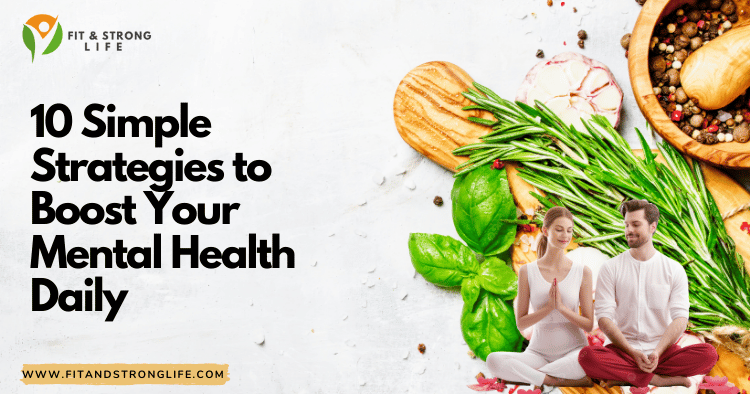Table of Contents
- Practice Mindfulness
- Stay Physically Active
- Maintain a Balanced Diet
- Establish a Sleep Routine
- Connect with Others
- Limit Social Media Use
- Engage in Creative Activities
- Set Realistic Goals
- Practice Gratitude
- Seek Professional Help When Needed
1. Practice Mindfulness
Mindfulness is the practice of being fully present in the moment, which can significantly reduce stress and anxiety. By focusing on your breath or observing your thoughts without judgment, you can cultivate a greater sense of awareness. Research shows that mindfulness meditation can decrease symptoms of anxiety and depression (American Psychological Association).
“Mindfulness is not about getting anywhere else; it’s about being where you are.” — Jon Kabat-Zinn
How to Get Started:
- Dedicate 5-10 minutes each day for mindfulness meditation.
- Use apps like Headspace or Calm to guide you.
2. Stay Physically Active
Regular physical activity is not just good for your body; it’s vital for your mental health too! Exercise releases endorphins, known as the feel-good hormones, which can enhance your mood. According to the Mayo Clinic, even a short walk can help alleviate feelings of depression and anxiety (Mayo Clinic).
“Exercise is a celebration of what your body can do. Not a punishment for what you ate.” — Unknown
Quick Workouts to Consider:
| Activity | Duration | Benefits |
|---|---|---|
| Walking | 30 mins | Boosts mood |
| Yoga | 30 mins | Reduces stress levels |
| Dancing | 30 mins | Increases joy |
For more ways to enhance your fitness while boosting mental health, check out our article on 10 Essential Tips for Boosting Your Mental Fitness Today.
3. Maintain a Balanced Diet
What you put into your body affects your mind. A diet rich in fruits, vegetables, whole grains, and healthy fats can boost your mood and energy levels. Foods like fatty fish, nuts, and leafy greens have been linked to lower rates of depression (Harvard Health).
“Eating well is a form of self-respect.” — Unknown
Foods to Include:
- Fatty fish (salmon, mackerel)
- Leafy greens (spinach, kale)
- Whole grains (quinoa, brown rice)
Consider incorporating our Top 10 Essential Vitamins and Minerals for Fitness Gains for a more nutrient-rich diet.
4. Establish a Sleep Routine
Quality sleep is crucial for good mental health. Lack of sleep can lead to irritability and anxiety. Try to establish a regular sleep schedule, aiming for 7-9 hours of quality sleep each night. The Sleep Foundation recommends creating a bedtime routine to signal your body that it’s time to wind down (Sleep Foundation).
“Sleep is the best meditation.” — Dalai Lama
Tips for Better Sleep:
- Avoid screens 30 minutes before bed.
- Create a calming bedtime ritual (reading, gentle stretching).
For more on how proper nutrition ties into sleep quality, refer to our 10 Essential Nutrition Tips for Effective Strength Training.
5. Connect with Others
Social connections are essential for mental well-being. Spending time with family and friends can help you feel supported and understood. Research indicates that social isolation can lead to mental health issues, so make an effort to engage with your loved ones regularly (National Institute of Mental Health).
“Friendship is born at that moment when one person says to another, ‘What! You too? I thought I was the only one.’” — C.S. Lewis
Ways to Connect:
- Schedule weekly catch-ups over coffee or video calls.
- Join a local group or club that interests you.
Also, for insights on how nutrition can enhance social interactions, check out our article on 10 Healthy Snacks to Fuel Your Fitness Journey.
6. Limit Social Media Use
While social media can help you stay connected, excessive use can lead to negative feelings and comparisons. Setting boundaries for your social media use can help maintain your mental health. Consider taking regular breaks or unfollowing accounts that trigger negativity.
“Comparison is the thief of joy.” — Theodore Roosevelt
Social Media Guidelines:
- Limit usage to 30 minutes a day.
- Unfollow accounts that make you feel inadequate.
For further understanding of how mental health relates to fitness, explore our piece on 10 Proven Strategies to Boost Your Focus and Concentration.
7. Engage in Creative Activities
Creativity can be a powerful outlet for emotions and stress. Whether it’s painting, writing, or playing a musical instrument, engaging in creative activities can enhance your mood and promote relaxation. Studies show that creative expression can reduce anxiety and improve overall well-being (Psychology Today).
“Creativity is intelligence having fun.” — Albert Einstein
Ideas to Get Started:
- Join a local art class.
- Start a journal to express your thoughts and feelings.
You can also engage in creative cooking to improve your diet. Check out our article on Top 7 Pre-Workout Foods for Optimal Performance to fuel your creative side.
8. Set Realistic Goals
Setting achievable goals can provide direction and a sense of purpose. Break larger goals into smaller, manageable steps, and celebrate your achievements along the way. This practice can help boost your self-esteem and motivation (MindTools).
“A goal without aSure! Please provide the Markdown content that you would like to convert to HTML, and I’ll assist you with that.Sure! Please provide the Markdown content that you would like to convert to HTML.
Visited 1 times, 1 visit(s) today




